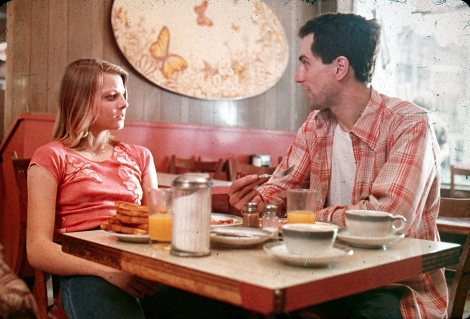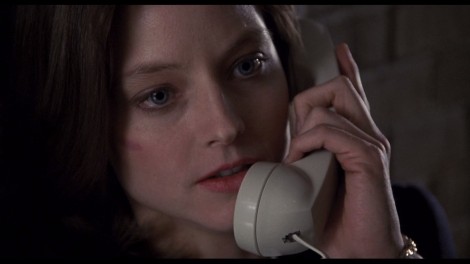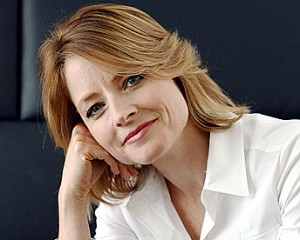David Mermelstein is an AwardsLine contributor. This article appeared in the Jan. 2 issue of AwardsLine.
Few stars can rival Jodie Foster’s durability. One has to go back to Hollywood’s golden age—to the likes of Judy Garland—to find those who even approach her successful transition from childhood roles to adult parts. And what other child actor started directing after accomplishing that transition? None. Which is why it’s fitting that the Hollywood Foreign Press Association is bestowing on Foster its highest honor, the Cecil B. DeMille Award.
Foster has been with us so long, it’s almost impossible to believe she’s just 50. Amazingly, it’s been 20 years since she won her second best-actress Oscar (for Silence of the Lambs). Her first came three years earlier (for The Accused). But her first Academy Award nomination dates back to 1977, for Taxi Driver, in which she played a young teen prostitute, opposite Robert De Niro and Harvey Keitel.
“I’ve been doing this a long time,” Foster says with typical understatement during a recent phone interview. “And it feels like a long time, but it also feels great. I don’t remember ever starting. My earliest memories are doing commercials and TV. And here comes this celebration of my whole life. So now what? Hopefully there’s more to come.”
There no doubt will be for Foster, who continues to eye both acting and directing projects with an eagerness tempered by discernment. Yet she acknowledges a certain ambivalence regarding her career. “I don’t know if I have the personality for it,” she says. “I’m not sure if I’d not fallen into it, it’s what I’d have done. I mean this mostly as an actor rather than as a director, but I’m one for entirely different reasons from most people. It’s become a psychological evolution. I chose movies based on what I had to learn about myself, not because I had to act. There’s lots of things I’m not interested in, and I don’t want to play parts in those movies.”
Despite the wide range of roles Foster has undertaken and the very different plots of the three films she’s directed, she sees a throughline in her work. “I always feel like I’m making the same movie over and over again,” she says. “Nobody else seems to notice, but I do.” The perspective, though, is markedly different depending on whether Foster is acting or directing. “As an actor, I’m always playing solitary characters,” she says. “But as a director, I’m always making ensemble movies, which focus on lots of people’s lives and how they intertwine. Similar things interest me both as an actor and as a director but in totally different ways. As an actor, I’m attracted to drama; as a director, it’s humor—because it’s the story of my life, and I can’t be that serious about it. Being alone is a big theme in all my movies, both as a director and as an actress.”

The actress credits her mother, Brandy, with laying the groundwork for her transition from family-friendly roles to more serious work, and Taxi Driver (1976) was the turning point. The film’s producer, Michael Phillips, remembers director Martin Scorsese’s determination to cast Foster, an instinct that really paid off. “She was only 12 and kind of shy,” Phillips recalls. “But she was very intelligent and quite mature. She just had the acting chops. She was very natural in the character and seemed unthreatened and undaunted by the sexuality. That was one of the big issues—how comfortable she would be with that material. She was doubled for the sexual material; some of it her sister did. But she was exposed to blood and violence. It was just her politeness that gave away her age. She was impossible not to like and respect, and it was amazing how much self-possession she had at that age.”
By the time Foster appeared in The Accused (1988), there was no denying that a major actress had arrived. Yet she insists that even after she made that film, she had doubts about spending the rest of her life in pictures. “Right after The Accused, I was heading to grad school and thought that was the last of those. Part of me was disappointed in my performance. Then I saw the movie and realized that a lot of it was about fear and a lot was unconscious. And also I thought, Literature doesn’t wake me up at 5 in the morning. So grad school wasn’t going to do that.”

Her perseverance in Hollywood was rewarded with The Silence of the Lambs (1991), which won five Academy Awards, including best picture. Jonathan Demme directed Foster to her second best actress Oscar, yet he credits her with helping him shape his conception of the film. “The first time I met Jodie,” Demme says, “we hadn’t started casting yet. But she reached out to express her deep regard for the book. She described it as the story of one young woman desperately trying to save the life of another young woman, with these roadblocks put up by all these men. And something really clicked for me when she said that, and that became the theme that guided me in making the movie, and it impacted endless decisions. I was so moved by what she said that I named my production company Strong Heart in honor of Jodie’s thematic inspiration. I treasure how she oriented me as how best to tell this story.”
Though modest about her two Oscars, Foster willingly acknowledges their impact on her career. “It’s like winning the lottery,” she says. “It doesn’t mean you’re a better person. At the same time, after my first Oscar, I was able to say, ‘OK, I’m doing this incredibly risky thing. I’m going to try and direct.’ It gave me some kind of passport that I might not have had. But I also think the reason you were given the honor is because you played from the heart, not because you followed a rulebook. And you learn you have this great saber, which allows you to make decisions against the tide. Silence of the Lambs was not something people expected me to do. But I loved this book and this character, and the film operates at such a high level. And by the way, I just won an Oscar, so too bad. It was really the best decision I could have made.”
The impact of those wins resonates even now, for the avenues they opened offered Foster a way to remain fulfilled in Hollywood. “I think it’s something I’ll probably do my whole life and also something I need a break from a lot,” she says. “But there’s lots of different ways to tell stories and lots of different ways to make films. I’ve only directed three movies, and I’ve got a lot to learn, and there’s a lot ahead for me there. It’s hard getting movies off the ground—harder and harder every year. My goals are humble as a director. They’re really about having the films as an expression of who I am. As an actor, you can’t really do that. You do it and move on. But directing, well, that’s me. It requires a real 100 percent investment in all levels of the storytelling.”
Foster isn’t shy about owning up to missed opportunities, even if she isn’t eager to mention specific projects. Yet she remains optimistic. “I’ve had a weird career, and I get a lot of grief for it,” she says. “What I choose is just really personal, especially as a director. I can’t just go, ‘I like scuba diving, so let’s do a scuba diving movie.’ It has to be something I would die for. And because it’s the story of your life, there are the popular parts and the parts nobody likes and the parts people don’t understand. But I have to make those movies, too.”


“One has to go back to Hollywood’s golden age—to the likes of Judy Garland—to find those who even approach her successful transition from childhood roles to adult parts. And what other child actor started directing after accomplishing that transition? None.” Wrong. I would respectfully submit the name of Jackie Cooper.